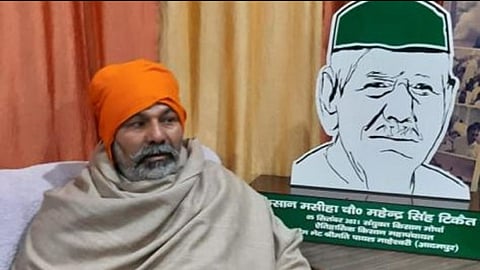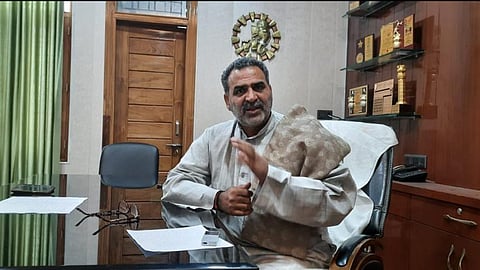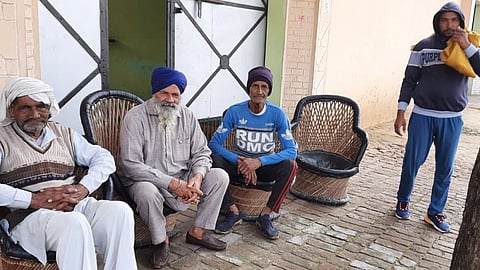Both of them had an old relationship but this election sees them on opposite sides, and yet they don’t utter a word against their opponent. Contrarily, their camp betrays a subtle longing for togetherness. One is Bharatiya Kisan Union’s spokesperson Rakesh Tikait and the other is Union Minister Sanjeev Balyan. Residents of Muzaffarnagar, both Jat leaders belong to the Baliyan Khap of Jats whose head or chaudhary is Rakesh’s elder brother Naresh Tikait.
Can Jat Anger And Agrarian Unrest Triumph Over Hindu Identity?
A powerful leader of the farmers’ movement that forced the central government to withdraw the farm laws, Rakesh Tikait wants the defeat of the BJP.
A powerful leader of the farmers’ movement that forced the central government to withdraw the farm laws, Rakesh Tikait wants the defeat of the BJP. The Sanyukt Kisan Morcha has urged people to “punish the anti-farmer BJP”. Whereas, Baliyan is fighting to protect the BJP’s dominance in Western UP that is now threatened by the Samajwadi Party-Rashtriya Lok Dal alliance, fully supported by Tikait.
Outlook interviewed both of them at their Muzaffarnagar homes this week. Campaigning was in full heat, taking no prisoners, and yet Tikait didn’t name Balyan; and Balyan who is not known to mind his language against political opponents tried hard to be respectful towards “chaudhary sahab”. “I have been an MP for 7-8 years. There’ve hardly been three months when I haven't visited them. You can check the records.”
Asked about the reason for the affection among the adversaries, minister Balyan’s aide says: “Tikait Sahab kabhi apni khap ke logon ka naam nahin lete. After all, we are one.”

This camaraderie adds another layer of complexity to Jat politics, which is crucial to the first phase of elections in 57 seats. The entire Tikait household of powerful Jats had been solidly with the BJP for years, but the party’s handling of the farmer’s movement changed the situation. “Humne thok ke BJP ko vote diya tha (We gave a thumping vote to the BJP). But look how they treated us,” says Lokesh Kashyap, an attendant at Tikait’s home.
The sentiment is repeated in several Jat-dominated villages in Muzaffarnagar. “We voted for them, but Kisanon par lath pade (They caned farmers),” says an old farmer Sukhbir Singh in Malikpura village.
The SP-RLD alliance
The Jats dominate over 40 assembly seats in West UP in districts from Agra to Bijnor, and their vote in the first two phases (with the maximum in the first phase) can set the tone for the entire state. For long the RLD, carrying forward the legacy of former Prime Minister Chaudhary Charan Singh, believed itself to be the sole claimant to the Jat identity. The party also managed to stitch together an alliance with Muslims in some seats in the past. Not long ago, RLD’s candidate Kaukab Hameed Khan had won from the Jat-dominated Baghpat constituency. Since 2014, however, Jats shifted to the BJP largely because of communal polarization that was aggravated by the 2013 riots in Muzaffarnagar which firmly put Muslims and Jats against each other. In the 2017 assembly elections that saw the BJP receiving a mammoth majority with 312 of the 403 seats, the RLD managed just one seat.
What makes the alliance a little shaky is the fact that the OBC Jats have not had a comfortable relationship with Yadavs, another OBC caste that rose to dominance during the Samajwadi rule. Both the strong OBC castes have been contesting for the same social and political space. Precisely, therefore, while the SP-RLD alliance may look formidable on paper, bringing together Muslims-Jats-Yadavs under an umbrella, it is an attempt at a harmony that doesn’t look very strong on the ground.
“Jats can never vote for Akhilesh Yadav,” Balyan asserts, stressing on ‘Yadav’.

It also makes the Muslim vote uncertain for the SP-led alliance. A large number of Muslims have traditionally voted for the SP, but a Muslim political observer in Deoband says: “It’s still not clear whether the Jats are voting for the alliance. If it looks like they don’t, Muslims will shift to the BSP.” “Why would they waste their vote over the alliance? The BSP may stand a better chance.”
Not only the Muslims don’t fully trust that the Jats will vote against the BJP, but the scars of the 2013 riots are also still fresh. “How do you forget that Jats seized your farmland during the riots and you are now displaced in your own hometown, living in a refugee colony?” asks the Muslim political observer.
And then there are other parties eyeing for their pie in the Muslim vote. Mayawati doesn’t seem to be contesting the election for a victory in Lucknow, but the choice of her candidates makes her intentions clear. She’s focusing on just around 100 seats in Uttar Pradesh on which either her party has a strong chance, or she can spoil the alliance’s prospects. In all the seven constituencies of Saharanpur, for instance, BSP’s candidates are set to dent the alliance votes. There’s also Asaduddin Owaisi’s All India Majlis-e-Ittehadul Muslimeen, a non-existent party whose Muslim candidates will nevertheless damage Samajawadi’s Muslim votes. In Deoband, his party has fielded Umer Madni, nephew of Darul Uloom’s Principal’s Maulana Arshad Madni. The religious symbolism of his party is unmistakable.
The anger against the BJP
All these combinations, however, don’t negate the fact that the BJP may not be able to repeat its 2017 performance. Tikait’s support and the anger of farmers may ensure that the SP-RLD alliance eventually gathers more seats than the parties individually got in 2017.
Tikait firmly says: “A farmer who sells his crop at half a cost knows where to vote. The Prime Minister’s project is digital India, but a sugarcane farmer gets his amount in 11 months. There’s a legal provision for the interest on delayed payment, but it’s not paid. We beg for the money that is due to us.”
There are similar stories of distress in the sugarcane belt, unemployment and loss of livelihood after the pandemic. The BJP may lose its lead in the first phase that had given them an invincible lead in the 2017 elections. On Tuesday, a BJP member from Baghpat, Rajiv Tomar, devastated by financial loss, consumed poison with his wife Poonam Tomar on Facebook live. While she died soon, he's struggling in the ICU. In his Facebook live video, he blamed Prime Minister Narendra Modi for his condition. "Friends, share it widely...Modi will be responsible for my death...Modiji if you have the slightest shame, change yourself. You are not a well-wisher of small shopkeepers and farmers."

It's not a lone instance. There are many similarly sad stories in the hinterland, not to forget the devastation that had swept through UP during the second wave last year. Such unrest should be sufficient to bring a regime change, but will it be consequential enough to dislodge the party riding on the Hindutva identity?
A Dalit worker in a brick factory on Meerut-Shamli border spells it out. “The Jats may not want to vote for the Samajwadi-led alliance, but they have no other option. This is the fight for the Jats to save their identity,” says Praveen Kumar.
A vote that doesn’t rest on natural affiliations is always shaky. Its tilt may define the first phase and, consequently, the entire state.
Tags